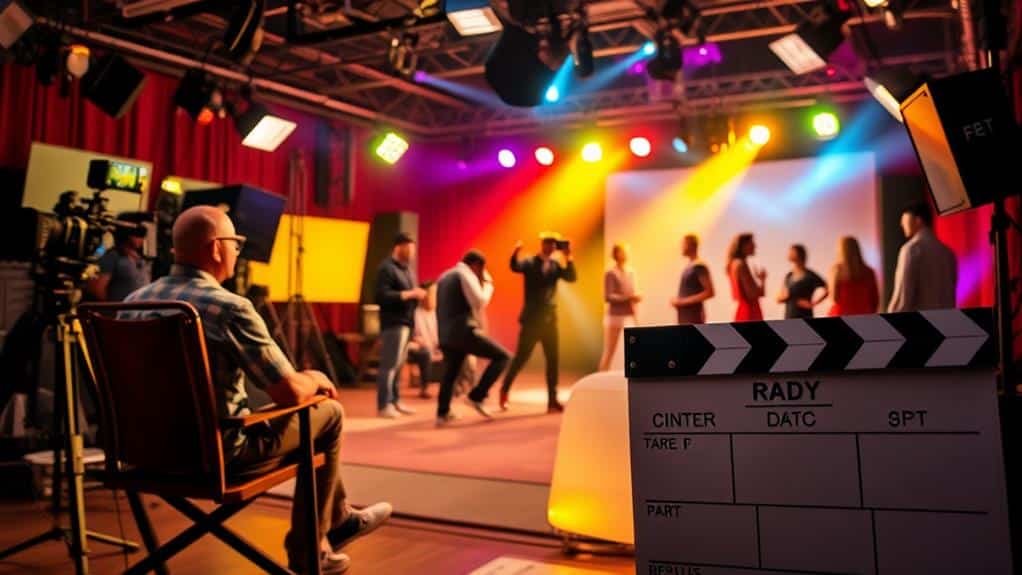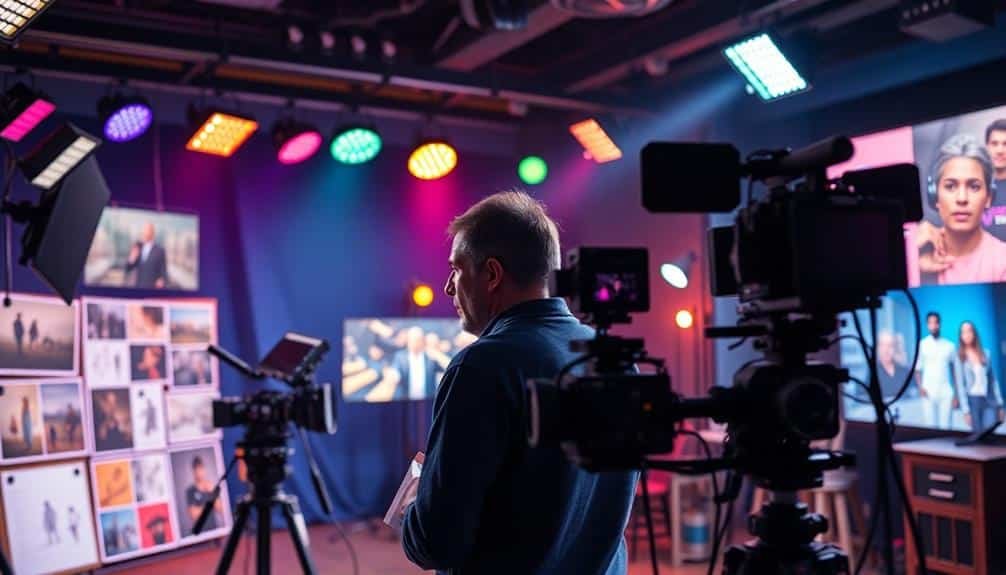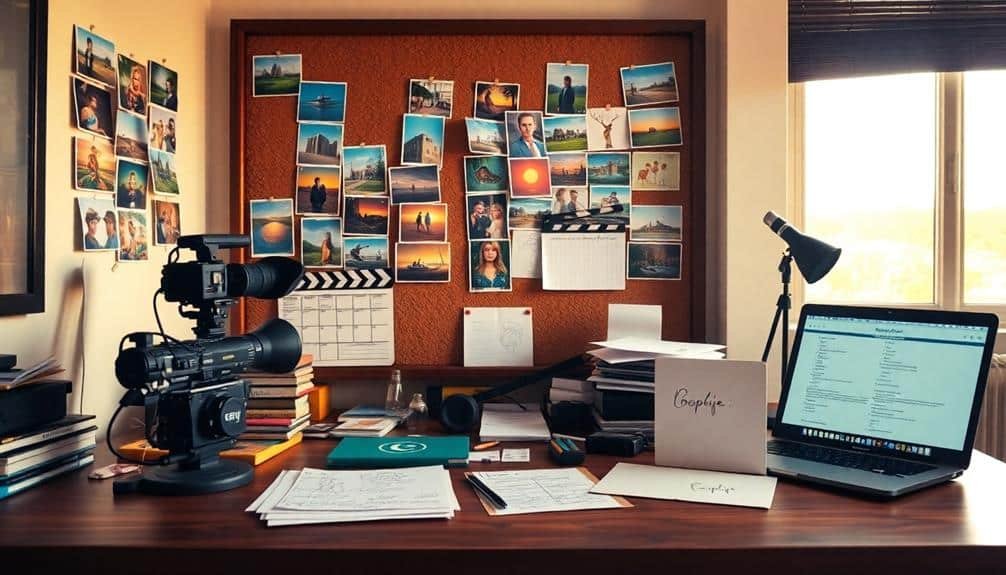
Stepping into the film director’s chair allows you to shape stories and ignite your creative vision. You’ll need strong communication and leadership skills to inspire your cast and crew. A film director will begin by storyboarding their ideas and crafting a clear roadmap for filming. Engage with your actors early, fostering an environment where they can explore their characters authentically. As you navigate the filming process, stay adaptable to unexpected challenges while keeping the narrative flow intact. Once filming wraps, focus on post-production to polish your film’s rhythm and mood. If you’re enthusiastic about uncovering more about each stage of this exciting journey, there’s plenty more to explore.
Key Takeaways
- Understand the director’s role in shaping the film’s vision and executing it through effective communication with the cast and crew.
- Enhance your skills with formal education and hands-on experience to balance creativity and organization in filmmaking.
- Develop your unique storytelling approach by drawing from personal experiences and collaborating with your team to refine your vision.
- Master storyboarding and pre-production to create a clear roadmap, ensuring a well-organized filming process that minimizes stress.
- Embrace the post-production phase, working closely with editors to polish the film and enhance its emotional impact through sound and visual effects.
Understanding the Role of a Film Director

As a director, you play a pivotal role in shaping a film’s vision and execution. Your film director job description encompasses various responsibilities, from translating a script into a compelling visual narrative to guiding your cast and crew through the filmmaking process. Your creative vision is the heartbeat of the project, influencing every element, from cinematography to sound design.
To effectively manage your film, you need to wield project management tools that help you track progress, allocate resources, and adhere to schedules. This requires a blend of technical skills and artistic insight, as you must communicate effectively with your team, ensuring everyone understands your vision.
While hands-on experience is invaluable, consider enrolling in a film school program to deepen your understanding of the industry. In this role, you’ll not only oversee artistic decisions but also navigate practical challenges, making adaptability essential.
Your ability to balance creativity with organization will define your success. Embrace the complexities of directing, as each project will teach you something new, refining your craft and enhancing your storytelling prowess. With dedication, you’ll transform your creative vision into unforgettable cinematic experiences.
Essential Skills for a Film Director

To excel as a director, you need a blend of essential skills that will elevate your filmmaking. First, communication is key; you must convey your vision clearly to your cast and crew. Strong leadership skills help you inspire and manage diverse teams, vital for film directors who juggle multiple responsibilities.
You should also develop your storytelling abilities, as crafting compelling narratives is at the heart of successful filmmaking. Formal education in film studies can provide a solid foundation but don’t underestimate the value of real-world experience. Get hands-on by working on independent films or assisting experienced directors to sharpen your filmmaking skills.
Additionally, proficiency in video editing is vital. Understanding post-production processes enables you to make informed decisions during filming, ensuring your vision translates seamlessly to the screen.
Embrace collaboration; working closely with writers, cinematographers, and editors enriches your projects.
Building Your Creative Vision

Building a creative vision is like laying the foundation for your film. As a budding director, you need to articulate what you want to convey through your storytelling. This process begins with understanding your influences, whether they’re specific genres, filmmakers, or themes that resonate with you.
In film school, you’ll learn that building your creative vision isn’t just about aesthetics; it’s about crafting a cohesive narrative that speaks to your audience. Successful directors often draw from their unique experiences and perspectives, allowing them to innovate within the film industry.
When directing, think about how every element in filmmaking, dialogue, cinematography, and sound, serves your vision. This means collaborating with your team to guarantee everyone aligns with your artistic goals.
Embrace feedback and evolve your ideas, as even the most professional film director started somewhere.
Storyboarding and Pre-Production for the Film Director

Once you’ve solidified your creative vision, it’s time to bring it to life through storyboarding and pre-production. This critical phase lays the groundwork for your film projects, enabling you to visualize each scene before you step into the director’s chair.
Start by sketching out your storyboards; they serve as a roadmap, helping you communicate your vision to the entire crew.
During this training phase, focus on the flow of the narrative, shot composition, and the integration of visual effects. Each frame should capture the essence of your story, allowing you to refine your creative process. Think about how shifts will work, and note the emotional beats you want to highlight.
Pre-production also involves assembling your team, scouting locations, and scheduling. These logistical details are essential, as they can greatly impact your film’s outcome.
Don’t overlook the importance of thorough preparation; it’ll save you time and stress during production. By mastering storyboarding and pre-production, you set a strong foundation, ensuring that when the cameras roll, you’re ready to deliver your vision with clarity and purpose.
Working With Actors

As a director, working with actors is one of the most rewarding aspects of filmmaking. The relationship you build with your cast is vital; it’s here that your vision transforms into a living, breathing entity.
Engage with your actors early on. Understand their perspectives and encourage them to explore their characters deeply. This collaboration becomes a powerful tool in your arsenal as a movie director.
Film directors often rely on actors to bring emotional depth and authenticity to their stories. Create an environment where actors feel safe to express themselves. Honest feedback fosters trust and enhances performance.
You’re not just managing talent; you’re nurturing artistry.
Don’t forget the importance of synergy between the actors and your film professionals, including the director of photography and the sound design team. This collective effort guarantees that every frame resonates with the desired emotional impact.
Embrace the rehearsal process, it’s an invaluable opportunity to refine performances.
Navigating the Filming Process

With a solid foundation established through your work with actors, it’s time to change your focus to the filming process. This phase is essential in the filmmaking journey and requires your keen attention to detail.
Begin by reviewing your shooting script; it’s your roadmap. Communicate clearly with your crew, including the cinematographer and the sound department, to guarantee everyone is aligned with your vision.
As you set up each shot, consider the film history that influences your style. Draw inspiration from past masters, but don’t forget to innovate. Keep an eye on the continuity, as even small oversights can disrupt the narrative flow.
During filming, maintain a collaborative atmosphere. Film producers will appreciate your ability to adapt to unexpected challenges, whether it’s lighting issues or actor performance adjustments. Engage with your video editor, discussing potential cuts and changes while keeping post-production in mind.
The filming process is where your vision comes to life, so embrace the excitement and focus on capturing those authentic moments.
Post-Production Essentials
After filming wraps, the real magic begins in post-production. This phase is where you’ll transform raw footage into a polished film. As a director, you’ll collaborate closely with your editor, typically an assistant director or a department head, to guarantee your vision comes to life.
Video post-production involves more than just cutting scenes together; it’s about pacing, rhythm, and storytelling. You’ll need to decide which shots best convey your narrative and maintain audience engagement. Professional assistance in this area can elevate your project considerably.
Sound editing is equally essential. It’s not just about dialogue; it involves creating ambient sounds, adding music, and making sure audio levels balance perfectly. Poor sound can detract from even the most stunning visuals, so invest time in this aspect.
Don’t underestimate the power of color correction and visual effects. These elements can enhance the mood and tone of your film, making it more immersive for viewers.
Frequently Asked Questions
What Equipment Do I Need to Start Directing Films?
To start directing films, you’ll need essential equipment to bring your vision to life. A good camera is key; whether it’s a DSLR or mirrorless, invest in one that suits your budget.
You’ll also want quality lenses, a tripod, and audio equipment to capture clear sound. Don’t forget lighting gear softboxes or LED panels can enhance your scenes.
How Do I Find a Film Crew for My Project?
Finding a film crew for your project involves networking and outreach.
Start by leveraging social media platforms, film forums, and local filmmaking groups to connect with potential crew members. Attend film festivals and workshops to meet industry professionals.
When you’ve identified candidates, hold interviews to assess their skills and compatibility with your vision.
Don’t forget to create a detailed project brief to attract the right talent who shares your passion and goals.
What Are Some Common Beginner Mistakes to Avoid?
In filmmaking, “measure twice, cut once” rings true. As a beginner, you might rush decisions, neglect pre-production, or underestimate your budget.
Avoid skimping on planning; it’s essential. Don’t ignore communication with your crew, clear expectations lead to a smoother shoot.
Finally, be open to feedback and adapt your vision. Embrace mistakes as learning opportunities.
How Do I Secure Funding for My Film?
Securing funding for your film requires a strategic approach. Start by crafting a compelling pitch that highlights your vision and the unique aspects of your project.
Identify potential investors, grants, or crowdfunding platforms that align with your film’s theme.
Network within the industry to build relationships and seek advice from experienced filmmakers.
Don’t underestimate the power of social media to generate interest and support; it can greatly boost your funding efforts.
Can I be a Film Director Without Formal Training or Education?
Absolutely, you can direct without formal training or education. Many successful directors started with passion and hands-on experience.
You’ve got to immerse yourself in filmmaking, study great films, and practice your craft. Collaborate with others, learn from their expertise, and don’t shy away from experimenting.
While formal education can be beneficial, your unique vision and dedication can set you apart. Trust in your instincts and keep honing your skills.
Begin Your Journey as a Film Director Now
Stepping into the director’s chair might seem intimidating, but remember, every great director started somewhere. You don’t need to have all the experience in the world; passion and a willingness to learn are your greatest assets. Embrace the challenges, collaborate with your team, and let your creativity shine. With each project, you’ll grow and refine your unique voice. So grab that camera and start telling your stories…you’ll be amazed at what you can achieve!




